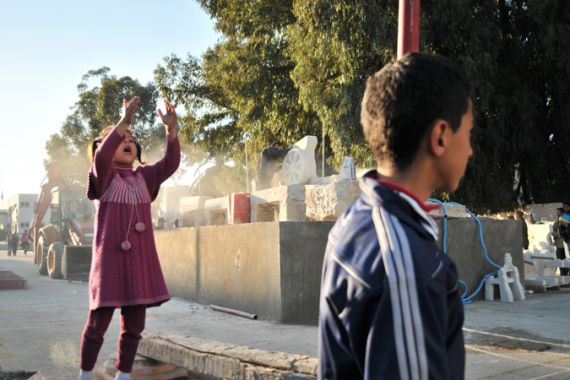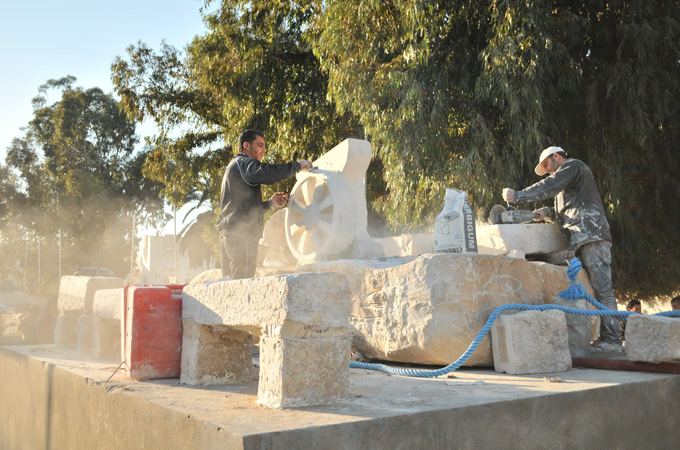One year on, Sidi Bouzid waits for change
A year after Mohammed Bouazizi set himself alight, little has improved in the town where the Arab Awakening began.

 |
| A monument to Bouazizi is built to mark the anniversary, but will Sidi Bouzid accept it? [Ali Garboussi] |
A young Tunisian fruit vendor’s self-immolation has now gone down in history as the trigger for what is arguably the most widespread series of popular protests since the anti-colonisation movements of the 50s and 60s.
A disinherited young man’s act on December 17, 2010, in the small town of Sidi Bouzid, remains the undeniable origin of what has been described as the Arab Awakening.
While change may have come to Tunis, Cairo and Tripoli, in Sidi Bouzid, most are still waiting for the change for which they risked their lives when they took to the streets that day, Mohammed Bouazizi’s legacy closer to home is far more ambiguous.
|
Looking back: Sidi Bouzid |
|
|
The 26-year-old died of his burns on January 4. His family was left behind, to weather not only the loss of their son and brother, but the media storm that has followed.
Many of the people of Sidi Bouzid appear frustrated that their struggle has been reduced to the story of one man, rather than a collective uprising during which 219 Tunisians lost their lives and many hundreds more suffered crippling injuries.
Much of this anger has been directed at the Bouazizi family. Manoubia, the vendor’s mother, has been honoured at events in New York, Paris, Doha and Istanbul.
“My son was the spark of the revolution,” she told Al Jazeera on the eve of the anniversary. “He spread it across the country, it rocked the Arab world, and then reached the rest of the world. I am proud of him and of all the martyrs.”
In Sidi Bouzid, however, she is less welcome. By April, the family had left the town to live in the upscale suburb of La Marsa, in Tunis, saying that the jealousy and rumours had just become too much.
The perception among others is that the family has dishonoured their son’s memory by accepting compensation money from the authorities, and that they had allowed his story to be used as fodder for politicians.
“We all sacrificed a lot during the uprising, so why is the Bouazizi family the only one getting media attention?” Fadhel Zawadi, a 27-year-old activist, asked.
“December 17 isn’t an anniversary but a starting point,” he said, arguing that people in the marginalised town have yet to see any economic or social benefits from their uprising, and that it is too early for celebrations.
He acknowledges that since the uprising, people have been able to participate in the country’s October election, and that they now have freedom of speech. Yet nothing, he says, has been done to solve their most pressing problems of socio-economic marginalisation.
“The basis of freedom is to eat and the right to work,” he said.
Fighting for a voice
The tension between Bouazizi’s status as a mythic figure, and the desire of his former neighbours to finally find a means to address injustices in their own lives, was already clear when we visited his family three days after Ben Ali’s fall.
Few Tunisian or foreign journalists had been to the town before, and hundreds of people gathered around us wherever we went.
Manoubia Bouazizi’s first televised interview, speaking live to the Arabic-speaking world for the first time on Al Jazeera Arabic, was interrupted by a rock-wielding neighbour desperate to be interviewed about his personal tragedy, after being voiceless for so long.
|
Video of the celebrations in Sidi Bouzid on the eve of the anniversary [Ali Garboussi] |
While many Tunisians continue to see Bouazizi as a hero, others reject the idea that he should be publicly honoured.
In a recent encounter underlining the resentment many feel, a taxi driver in Tunis recently refused to accept that one of the main arteries of the capital had been renamed Boulevard Mohammed Bouazizi.
“There’s no street with that name,” he insisted, despite my attempts to describe the prominent thruway.
“You do know we hate Bouazizi?” he asked incredulously, going on to claim the deceased was an alcoholic.
Seeing no other option than to refer to the Ben Ali-era name by which the boulevard had been known for nearly three decades, I tried asking for “the-boulevard-formerly-known-as-November-7”.
This was just too much, and he stopped the car, demanding that I get out.
The taxi driver is not alone in feeling this way, going by the vandalisation of sites and monuments to Bouazizi that have occurred throughout the year.
The Bouazizi family are not the only figures from the uprising to have been criticised by their fellow Tunisians for receiving attention from the outside world.
Lina Ben Mhenni, a blogger who was one of the leading citizen journalists throughout the uprising, allowing the outside world to follow what was happening inside Tunisia, was subjected to many venomous attacks on Twitter and Facebook on the eve of the announcement of the Nobel Peace Prize laureates, after reports that she was in the running for the prestigious award. She later said it was a relief when she did not win.
A revolution yet to be realised
For Handouni Nader, a union activist who participated in the uprising from that very first protest a year ago, the attacks against Bouazizi’s legacy are a distraction from the real issues.
“Mohammed Bouazizi gave his life for the Tunisian people,” Nader, who knew the street vendor well, said. “He was a good man who just wanted to work.”
Nader, who ran on an independent list in the Sidi Bouzid electorate in the country’s historic election in October, said the underlying issues of unemployment, underdevelopment and corruption are as bad as they were before the uprising.
“Nothing has changed in Sidi Bouzid, everyone feels let down,” the 36-year-old said. “This government must understand these things, and go beyond rhetoric to action.”
Tunisia’s first democratically elected government was appointed just days before the anniversary, after nearly a year of successive, highly contested, interim governments.
Moncef Marzouki, the country’s new president, has asked Tunisians for a six-month political truce so that the government can go to work on tackling the serious economic and social issues that continue to blight the lives of so many Tunisians, urging that the alternative is “collective suicide” for the small North African country.
On the anniversary of the day that started it all, the town was once again besieged by journalists in search of sound bites, seeking recollections of an uprising whose vision people here say has not yet been realised.
The mood in Sidi Bouzid – and Bouazizi’s local legacy – will doubtless hinge on whether the people here can finally share in the fruits of what was the collective rising up of a nation.
— With additional reporting from Ali Garboussi in Sidi Bouzid and Hashem Ahelbarra
Follow Yasmine Ryan on Twitter: @yasmineryan
